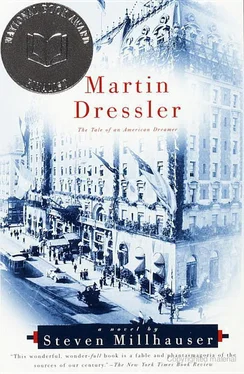Nevertheless it was always a relief to be seated again in the familiar circle of the hotel parlor, where he could talk easily with Emmeline and Margaret while watching Caroline out of the corner of his eye. The wedding had been set for early September, and Margaret Vernon threw herself into a flurry of meticulous planning. This too struck Martin as entirely proper, though the plans themselves held little interest for him. Sometimes it all seemed to him a grotesque sham, as if what everyone was really talking about was the night when Caroline would be alone in a room with him, naked and defenseless, with no way out — and at this thought, which filled him with remorse and desire, he would shift uneasily in his seat and glance at Caroline, who sat staring quietly before her with half-closed eyes.
The knowledge that he was going to marry Caroline Vernon, that he would be moving from his two rooms to a larger apartment on a different floor, made him fear that his friendship with Marie Haskova would undergo a change or even vanish entirely. Already it seemed to Martin that she was changing, as if she herself were going to be married; and a jealousy would come over him, at the thought that Marie was leaving him, that Caroline would soon be taking her away. It was cruel of Caroline to do that, even if he and Marie Haskova sometimes exchanged ambiguous glances, glances that, however harmless and playful they might be, nevertheless contained something forbidden. He hadn’t yet told Marie that he was going to be married. The slight deception disturbed him, for he wanted to be frank with Marie Haskova; and his faint, continual sense of wronging her made him hover close, as if he were trying to set things right.
In the hot days of August, Martin prepared to open two new cafes: one on the other side of town, on Second Avenue, and one in Brooklyn, on a shady side street off Fulton Street, a few blocks from City Hall Park. Dundee had been willing, even eager, to let Martin buy his share of the partnership, as if he’d gotten in over his head and were relieved to have his money safe in the bank at last. Martin planned to introduce a new kind of cookie into his five cafes, a modern gingerbread or sugar cookie in four shapes: a Broadway cable car, an El train engine, a Napoleon bicycle, and a Hudson River Day Line steamer. The head chef of the bakery had already ordered the tin molds. Martin next turned to the question of managers. Since the manager of the Boulevard Metropolitan lived in Flatbush, Martin transferred him to the Brooklyn Metropolitan — against the strong protest of Emmeline, who liked McFarlane and argued that the move would harm the cafe. She stared at Martin with a flash of fear when he promptly offered her the vacated post.
“But I can’t—”
“Of course you can,” Martin said. “Believe me. You already know everything about the business.”
“I don’t know. People will say you’re playing favorites.”
“What people? I’ll fire them. Look, Em. I want someone in there who knows the business, someone I can trust. You know I count on you. You’re my right-hand man.”
“I’m not a man.”
“Right-hand woman, then.” He paused to see whether he had hurt her. “Let me tell you something. You already practically manage that cafe. So do it in public. Go ahead and do it. You can do it. Do it.”
She laughed. “Maybe I just will. But keep your voice down. People are staring.”
For the new Second Avenue cafe Martin approached the thirty-year-old manager of a nearby lunchroom that he had discovered during his search for a new location, and offered a ten percent increase in salary. The young manager, who knew Martin, hesitated, folded his arms across his chest, worked a muscle in his cheek, and suddenly thrust out a strong hand. Martin reported the development to Walter Dundee at dinner the next night, and Dundee in return reported that the Vanderlyn was in trouble: the hotel was losing money, the owners were becoming impatient, old Mr. Westerhoven’s days were numbered. Poor Westerhoven seemed unable to make up his mind about anything important, but as if to show that he was a man of iron will he had become fanatical about trivial matters — a bad business, however you looked at it. What the hotel needed was thorough renovation, but Alexander Westerhoven wasn’t the man to see it that way, and even if he’d seen it that way he no longer had the confidence of the owners, who were unwilling to sink more money into a failing business and were said to be divided over what course to pursue. Dundee frowned suddenly and began rapping his forehead with the tip of a finger. His face cleared. “I’ve got it now. A message for you. That Hamilton woman was in last week, asked to be remembered to you. You remember Louise Hamilton.” A sharp regret came over Martin: nearly ten years had passed since his little adventure in Room 411. He wondered whether he had been happy then. “She used to send me out to buy cough syrup,” Martin said. He remembered the dusky parlor, her head resting on two pillows on the sofa, the skin below her eyes waxy and blue, the surprising silk-smoothness of her skin. He had entered her fever-dream: she had dreamed him. A big-boned woman. Marie Haskova: he wondered whether he had known it all along.
“We’ll be moving into a larger suite at the Bellingham,” Martin was saying.
“You like it up there, do you?” Without waiting for an answer Dundee continued: “Mother and sister staying on?”
“Yes.” He paused. “We get on well. What’s wrong with that?”
“Nothing,” Dundee said. “Not a thing.”
The two new cafes opened on consecutive Saturdays in early August, to the strains of German band music and the release of a thousand balloons. All children under twelve received a free prize: a little tin bank shaped like a slice of apple pie, with a coin slot at the top. Martin began taking the cable cars daily over the bridge to Brooklyn, where he was quickly satisfied that the new blue cafe had caught on nicely, and on his return he would stop first at the Second Avenue cafe, where the efficient young manager already spoke of expanding the premises by leasing the basement, and then at the Columbus Avenue cafe, and finally at the Boulevard cafe. Emmeline had taken command at the Boulevard, whose brick facade had received a fresh coat of skyblue paint and whose plate-glass windows glistened, but Martin saw that she needed continual reassurance about small matters, such as whether she had the authority to order new sets of salt and pepper shakers without first consulting him. She had had to speak to one of the waiters about his careless appearance and was worried about her tone, but Martin assured her that the staff liked and respected her. He saw that they did. He noticed small improvements about the place — green plants in the windows, a dish of free raspberry candies wrapped in cellophane beside the cash register — and decided to introduce them immediately into his four other cafes. “People like it here, Martin,” she confided with a worried look. “I can see that they do. But it makes them want to linger. The people waiting get annoyed. We lose customers.” She suggested a session for training waiters in the delicate art of moving customers gently along. “Mother is dashing around like mad,” she added, and for a moment Martin imagined Margaret Vernon running in and out of the restaurant with advice for Emmeline, before he realized that of course she was speaking of the wedding arrangements.
He noticed the arrangements out of the corner of his eye as he hurled himself into fifteen- and sixteen-hour days, typing letters, visiting his five cafes, studying managerial reports, keeping accounts. Sometimes he had the sense that, just outside the door of his office, a crowd of wedding guests was gathering — at any moment a great burst of music would sound, champagne would run down the sides of bottles, bouquets of flowers would spring up from empty vases. He had talked vaguely to Caroline of a wedding trip in the late winter or early spring, since it was out of the question for him to leave town now. The five-room suite, directly across the hall from Margaret and Emmeline, would be ready for occupancy a week before the wedding. Martin imagined Marie Haskova cleaning on the floor above, with her red-and-black feather duster. He had told her he was going to be married, but had not said when. In the summer evenings, he walked with the Vernon women to the Park and sat with them for a while in the lamplit parlor off the lobby, as if no one wanted anything to change. Caroline sat in her red chair. From beyond the parlor came muffled sounds of opening elevator doors, dim laughter, a noise in the street. Martin was tired.
Читать дальше












